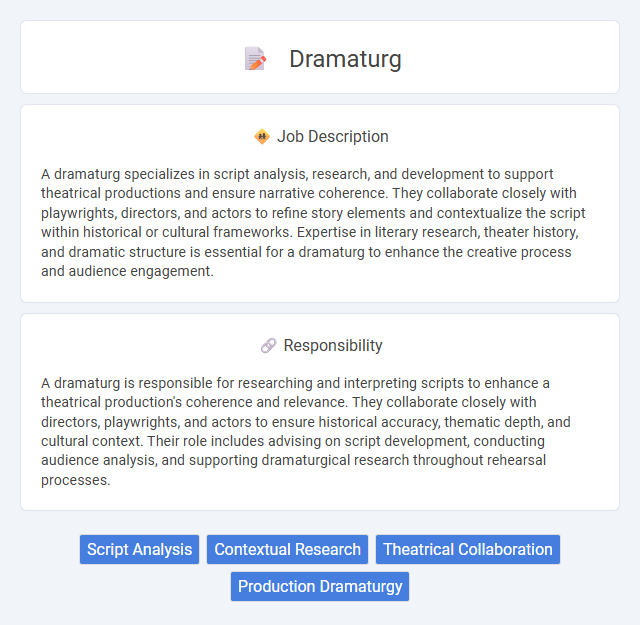
A dramaturg specializes in script analysis, research, and development to support theatrical productions and ensure narrative coherence. They collaborate closely with playwrights, directors, and actors to refine story elements and contextualize the script within historical or cultural frameworks. Expertise in literary research, theater history, and dramatic structure is essential for a dramaturg to enhance the creative process and audience engagement.
Individuals with strong analytical skills and a deep passion for theater are likely suited for a dramaturg role, as the job demands critical thinking and a thorough understanding of dramatic texts. Those who enjoy researching historical and cultural contexts may find the conditions engaging, while people less comfortable with collaborative work or tight deadlines might face challenges. The role often requires flexibility and resilience, so candidates prone to high stress could struggle to adapt effectively.
Qualification
A Dramaturg typically requires a strong background in literature, theater studies, or dramatic arts, often holding a master's degree in these fields. Expertise in script analysis, historical context, and dramaturgical research is essential to support directors and playwrights effectively. Proficiency in communication and collaboration enhances their ability to shape productions and contribute to the creative process.
Responsibility
A dramaturg is responsible for researching and interpreting scripts to enhance a theatrical production's coherence and relevance. They collaborate closely with directors, playwrights, and actors to ensure historical accuracy, thematic depth, and cultural context. Their role includes advising on script development, conducting audience analysis, and supporting dramaturgical research throughout rehearsal processes.
Benefit
A dramaturg likely enhances the quality and coherence of theatrical productions by providing critical research and script analysis, which can lead to more informed creative decisions. Their expertise probably supports playwrights and directors in shaping narratives that resonate deeply with audiences. Employing a dramaturg may increase a production's chance of critical and commercial success due to their specialized knowledge in storytelling and theatrical history.
Challenge
The role of a dramaturg likely involves navigating complex narrative structures and interpreting diverse playwright intentions, presenting ongoing intellectual challenges. They probably encounter difficulties balancing artistic vision with audience engagement, requiring keen analytical skills and adaptability. This position may demand continuous learning and collaboration, making it a dynamic and stimulating career path.
Career Advancement
Dramaturgs play a crucial role in theater production by conducting research, analyzing scripts, and collaborating with directors to shape the narrative and thematic elements of a performance. Career advancement often involves gaining experience through assistant or associate dramaturg roles, building strong networks within theater companies, and developing expertise in specific genres or playwrights. Successful dramaturgs may progress to lead dramaturg positions, artistic director roles, or pursue academic and consulting opportunities within the performing arts sector.
Key Terms
Script Analysis
A dramaturg specializing in script analysis meticulously examines the text to uncover underlying themes, character motivations, and structural elements that enhance the production's coherence and impact. This role involves collaborating closely with playwrights, directors, and actors to interpret both classical and contemporary scripts, ensuring narrative clarity and dramatic integrity. Deep expertise in literary theory, theater history, and cultural context supports the dramaturg's ability to provide insightful feedback and contribute to a dynamic, resonant theatrical experience.
Contextual Research
Dramaturgs specialize in contextual research to deepen the understanding of a play's historical, cultural, and social background, ensuring accurate representation on stage. Their work involves analyzing texts, exploring thematic elements, and consulting archives or experts to provide directors and actors with nuanced insights. This research shapes production choices and enhances audience engagement through informed storytelling.
Theatrical Collaboration
A dramaturg plays a crucial role in theatrical collaboration by bridging the gap between playwrights, directors, and actors to ensure the integrity and coherence of a production. They provide critical script analysis, historical context, and dramaturgical research that shape creative decisions and refine storytelling techniques. This collaborative synergy enhances the overall narrative impact and aligns the artistic vision with audience engagement.
Production Dramaturgy
Production dramaturgy involves collaborating with directors, playwrights, and designers to shape the creative vision and narrative coherence of theatrical productions. This role requires deep analysis of the script's themes, historical context, and audience reception to ensure accuracy and enhance storytelling impact. A production dramaturg also facilitates research, provides script adaptations, and assists in developing dramaturgical materials such as program notes and talkbacks.
 kuljobs.com
kuljobs.com